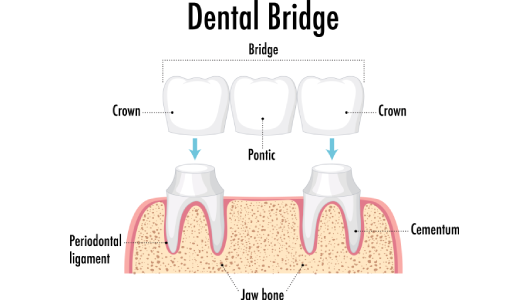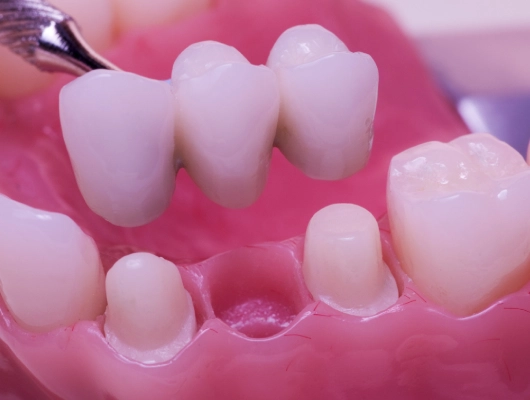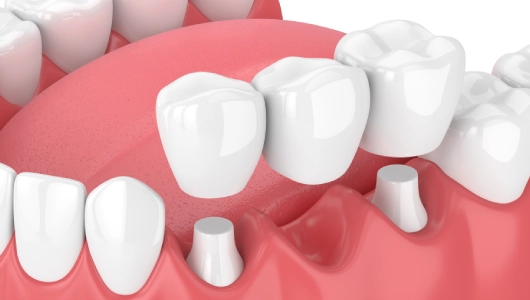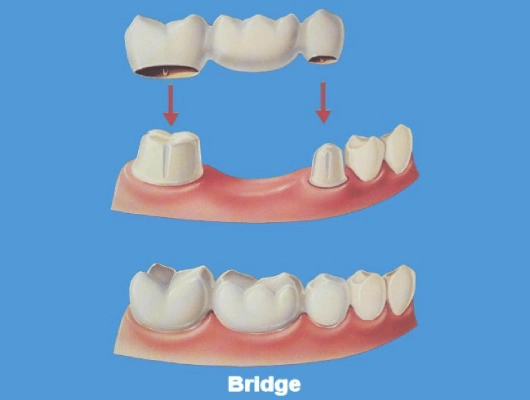Dental Bridges in Morgan Hill, CA
Dental Bridges
If you are missing one or more teeth, dental bridges can offer a great and inexpensive solution.
Your Dentistry has the Best Dentist in Morgan Hill ready to help create the perfect bridge to replace your missing teeth, restore your bite and your smile.


Dental Bridges for Missing Teeth
Bridges literally help close the gap between existing teeth, much like a roadway bridge. They can come in different sizes depending on the number of teeth missing, such as a 3-unit dental bridge, 4-unit bridge or a 5-unit bridge. Typically, a 3-unit bridge will have a crown on both ends and a false tooth or “pontic” in the middle. Dental bridges can be made from a variety of materials, including gold, porcelain or alloy.
Dental bridges can be both removable or fixed. A removable bridge or partial denture can be taken out by patients at home to clean, but fixed bridges can only be removed by your Morgan Hill dentist.
Dental Bridge Procedure
Here at Your Dentistry we specialize in providing superior results with high-quality ceramic bridges and crowns. Our team of well-trained dentists have the ability to digitally scan your teeth helping speed up the dental bridge fabrication process. The finished result is a long-lasting bridge that improves the overall look of your smile.

Ready to perfect your smile?
Types of Dental Bridges
Traditional Bridges
A traditional bridge utilizes a false tooth (a pontic) which is held in place by two dental crowns placed on the teeth adjacent to the gap being filled. Using two crowns provides greater stability and strength for the bridge.
Cantilever Bridges
Cantilever Bridges are used when the gap being filled by the bridge only has one adjacent tooth. In this case the pontic is only held in place by one dental crown bonded to the natural tooth adjacent to the gap.
Maryland Bridges
Maryland Bridges are an alternative to traditional bridges that utilize a framework of either metal or porcelain to hold the pontic in place. The framework is bonded to the backside of the natural teeth adjacent to the gap being filled.
Ready to schedule your dental bridge appointment?

Benefits of Dental Bridges
There are several significant benefits to dental bridges. These dental benefits include:
- Restoring your smile and confidence
- Helping you speak and chew properly
- Keeping existing teeth in the right place
- Distributing the force in your bite properly
For more information about dental bridges and how we can help, please call Your Dentistry 408-520-1782 and speak with one of our awesome dentists today.
FAQs
The number of appointments needed for a dental bridge varies based on the type of bridge you are getting, the initial fit once it is put in place, and other factors. Though many can be placed in just two appointments, some people need additional appointments to allow for adjustments of the bridge.
Though a dental bridge isn’t removed periodically, such as for cleaning, it may need to be replaced based on wear and tear, dental hygiene, and other factors. Dental bridges may need to be replaced every five to fifteen years, depending on a number of factors. Implant-supported bridges are a more permanent solution and usually do not need to be replaced the way traditional dental bridges are.
Dental bridges are not for everyone. Depending on the type of bridge, there are some factors that need to be considered, including the overall health of your mouth, whether you have teeth that can be used to support the replacement tooth, and other factors. If you are considering a bridge, your dentist can discuss these factors with you to find out whether a bridge is a good solution for your missing tooth.
If you have a missing tooth, a dental bridge not only restores your smile, but it can improve the functionality of your remaining teeth. Replacing the missing tooth also provides protection for the natural teeth on either side by closing the gap that would expose the teeth to additional bacteria and contaminants that can lead to damage.
You may be able to use a dental bridge to replace more than one missing tooth, if the teeth on either side of the gap can be used to support the replacement teeth. More than one missing tooth may also be replaced with implant-supported bridges. Your dentist can discuss the best options for your needs.
Contact Us
Discover Efficient, Predictable, And Convenient Dentistry
Opening Hours
Monday: 9am to 6pm
Tuesday-Wednesday: 8am to 5pm
Thursday: by Appointment
Friday: 8am to 5pm
Saturday: 8am to 4pm
Sunday: by Appointment
Our Location
Your Dentistry
Dental Practice of Dr. H Gondara
795 Cochrane Road, Suite 120, Morgan Hill, CA 95037
Phone: (408) 465-9016
Email: info@yourdentistrymh.com
Our Hours
Monday 9:00 AM – 6:00 PM
Tuesday 8:00 AM – 5:00 PM
Wednesday 8:00 AM – 5:00 PM
Thursday by Appointment
Friday 8:00 AM – 5:00 PM
Saturday 8:00 AM – 4:00 PM
Sunday – by Appointment
Stay Connected
